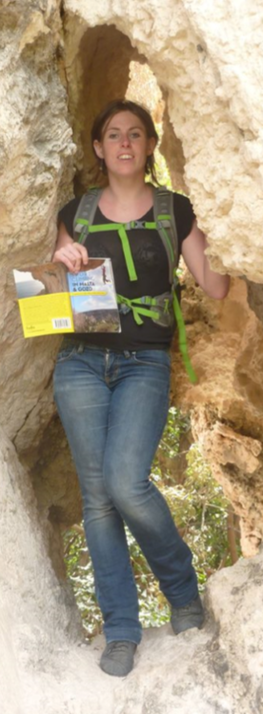Rowena Fletcher Wood
ECG Bulletin July 2016
ECG committee member Dr Rowena Fletcher-Wood is a science communicator. Her work includes organising adult science events for Science Oxford, freelance science writing, and tutoring.
|
What inspired you to become a science communicator?
As a child, I loved drama and acting. Back then, I thought I was more interested in the arts, but a fantastic chemistry teacher inspired me to study chemistry. Not long before I started my PhD in environmental chemistry I realised that I wanted to talk and write about science more than I wanted to research it. So I explored and found a role that combined the two: science communication. How did you become a science communicator? Gradually—and through determination. Science communication is difficult to get into because there are few jobs, particularly for recent graduates. Nevertheless, a huge range of science communication roles exist, from administrative roles at the RSC to children’s BBC presenters. Only a few places employ teams of science communicators (Science Oxford is one; science museums are others), so for most it is a lonely job. I got into it by multitasking in volunteer roles and taking up training opportunities during my years at university. I became a STEM ambassador and did science communication as a hobby. Could you describe your current job? I work three days a week for Science Oxford, where I plan, organise and deliver events that might involve making slime with adults, serious debates on topical scientific issues, or tasting evenings. During the other two days, I write and edit science articles for the science education company Things We Don’t Know and write for other organisations, such as Chemistry World, the Diamond Light Source, and companies producing educational resources. I also work as a tutor. Sometimes I perform science stories, magic, or demonstrations in shows. Every week is different, which is how I like it. What is your advice for anyone considering a career in this area? Don’t give up. Take every opportunity, including things you may not enjoy. Select short-term commitments so that you can find the most productive opportunities. Know your specialties and use them. Don’t take unpaid internships, which take work from professionals and are rarely the leg up they claim to be (professional bodies like the RSC pay their interns). Find someone to help you do your first tax return, even if it is HMRC (they are really helpful when they finally pick up the phone). Network like crazy, join the PSCI-COMM and BIG mailing lists, and go to conferences whenever you can. |
What are some of the challenges of communicating science?
Challenges include access to journals, widening participation and reaching the unengaged. Science policy and understanding scientific uncertainty in political decision-making are also really important. My daily challenges include communicating to mixed audiences, getting people to turn up for free events that they have booked, and limiting workshop materials to amounts I can carry.
What is the most rewarding aspect of your career so far?
Giving something to people: inspiration, cool facts, or access to knowledge that they could not understand before. I love coming up with creative ideas that make science fun and sharing the science I spent so many years learning.
If you weren’t a scientist what would you do?
I would be a writer and a climbing instructor. I have written fiction all my life and still do it. I’m also qualified climbing instructor.
Challenges include access to journals, widening participation and reaching the unengaged. Science policy and understanding scientific uncertainty in political decision-making are also really important. My daily challenges include communicating to mixed audiences, getting people to turn up for free events that they have booked, and limiting workshop materials to amounts I can carry.
What is the most rewarding aspect of your career so far?
Giving something to people: inspiration, cool facts, or access to knowledge that they could not understand before. I love coming up with creative ideas that make science fun and sharing the science I spent so many years learning.
If you weren’t a scientist what would you do?
I would be a writer and a climbing instructor. I have written fiction all my life and still do it. I’m also qualified climbing instructor.


